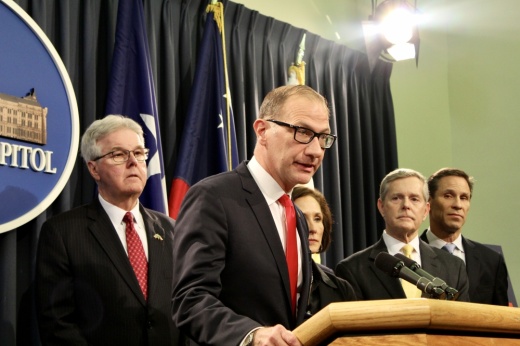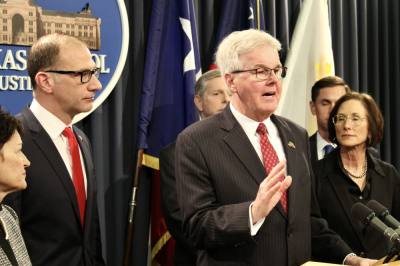The first bill in the package, Senate Bill 6, would create the Texas Energy Insurance Program. At a news conference, Sen. Charles Schwertner, R-Georgetown, said the program would add 10,000 megawatts of energy—enough to power 7.5 million homes—to the state power supply.
Schwertner said the program would provide backup power for the state, similar to the generators people buy for their homes. “Texas needs its own backup generator” that can be used in times of crisis, he explained.
SB 6 would also establish a low-cost loan program to “maintain, restore and keep in operation current dispatchable generation here in Texas,” Schwertner said. Dispatchable power is a form of energy that comes from sources like natural gas or coal. Supporting dispatchable power is a top priority of both Patrick and Gov. Greg Abbott.
Schwertner compared the proposed loan program to the State Water Implementation Fund for Texas, which provides loans to help local communities develop “cost-effective water supplies.”
Schwertner also highlighted SB 7, which would “level the playing field” between dispatchable and renewable power by providing incentives for companies to create new dispatchable energy.
SBs 6 and 7 were filed by Schwertner and Sen. Phil King, R-Weatherford, the chair and vice chair of the Senate Business and Commerce committee. Both bills are among Patrick’s top 10 priorities for the current legislative session, according to a news release from his office.
Schwertner said senators were working closely with the Texas House to pass the reform package. Similar bills have not been announced as part of House Speaker Dade Phelan’s priorities, but state representatives have filed various proposals on the topic.
“We’re gonna get this done for the people of Texas,” Schwertner said. “This is not a partisan issue; this should not be a bicameral House or Senate issue. This is an issue for Texas and Texas’ future.”
Senators also highlighted SBs 1287 and 2012, which would limit how much Texas consumers pay for power generation.
SB 1287, filed by King, would require the Public Utility Commission of Texas to place a cap on the average amount Texans will pay for the transmission and distribution of power. King said that when power companies build new generation facilities, it gets increasingly expensive the further a facility is built from its customers or the power grid it must connect to—and the customers foot the bill.
If passed, King said SB 1287 will likely encourage power companies to build generation facilities closer to their customers, keeping costs down for everyone involved.
SB 2012, by Schwertner and King, relates to the Performance Credit Mechanism, which was unanimously adopted by the PUCT in January. The PCM is meant to increase the reliability, accountability and affordability of the state power grid, according to the commission.
The bill would add “guardrails” to ensure that power companies minimally increase the energy prices for their customers and do not gouge prices. In the aftermath of Winter Storm Uri, many Texans received very high bills that they were unable to pay.
In a statement, PUCT Chair Peter Lake lauded the senators for their work.
“We are all working together toward the same goal, reliable and affordable energy for Texans,” Lake said. “They made clear [March 9] the PCM, which we unanimously adopted earlier this year, is an important part of the solution that will achieve this for the Texas grid. We look forward to continuing this work with legislators to ensure reliability, affordability and accountability in the Texas energy market today and for generations of Texans to come.”
SB 2012 would also create the Grid Reliability Legislative Oversight Committee, which would include four members each from the Texas House and Senate.
At the news conference, senators also shared information about bills that would protect the Texas power grid from attacks, strengthen the wholesale electric market and eliminate a state subsidy for renewable energy. The full energy reform package includes SBs 6, 7, 1287, 2010, 2011, 2012, 2013, 2014 and 2015.
“Every part of these reforms represents a significant victory for Texas ratepayers,” Patrick said in a news release. “Once these bills become law, our grid will be stronger for our Texas future, which is brighter than ever.”






